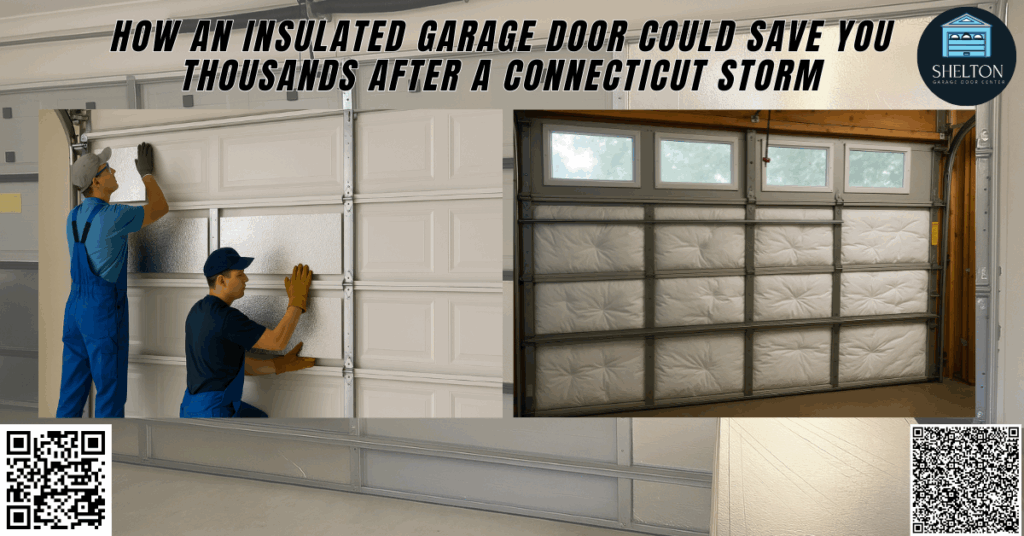Last fall, a family in Ansonia contacted us about their freezing garage that felt colder than the air outside. Their old single-layer steel door offered no protection from the harsh Connecticut winter. Once we installed new insulated garage doors with thick polyurethane foam and a reinforced steel shell, their garage temperature increased by 15°F even without a dedicated heating system. The result? More comfortable mornings, lower energy bills, and peace of mind.
According to the U.S. Department of Energy, garages attached to your home are a major source of energy loss, especially during extreme temperature changes. If your garage door is outdated or uninsulated, it acts as a giant thermal transfer point, letting cold air in and warm air escape. That means your heating system works harder and costs more to run throughout the season.
At Shelton Garage Door Center, we help homeowners across Ansonia, Derby, and the surrounding communities prepare their properties for winter. With an insulated garage door, you’re not just improving comfort. You’re upgrading your home’s energy efficiency, safety, durability, and resale value. Let’s explore why now is the perfect time to make this upgrade.
Why Insulated Garage Doors Are Essential Before Connecticut Winters
Connecticut winters bring snow, ice, freezing rain, and plummeting temperatures. Your garage, often the largest non-insulated space in your home, becomes a major weak point. Standard, non-insulated garage doors, often made of a single layer of steel or aluminum, do little to resist cold weather, thermal transfer, and condensation.
By contrast, insulated garage doors are built with multiple layers of material: typically an exterior steel or aluminum panel, a thick layer of insulation material (like polyurethane, polystyrene, or rigid foam), and a finished interior panel. These layers work together to create a thermal barrier that retains heat and reduces energy loss.
Polyurethane insulation, often injected into the door’s internal cavity, expands to fill gaps and provides the highest R-value, which measures thermal resistance. A higher R-value means better heat insulation and reduced temperature transfer. While older garage doors may have R-values as low as 2, modern insulated garage doors offer R-values ranging from 10 to 18 or higher, depending on the material and design.
Major Benefits of Insulated Garage Doors
1. Enhanced Energy Efficiency & Lower Bills
One of the biggest drivers for homeowners in Ansonia choosing insulated doors is the promise of energy savings. Whether your garage is attached or detached, a properly sealed and insulated garage door significantly reduces heat transfer between the outdoors and your indoor spaces. That means less heat escapes in the winter and less cool air escapes in the summer.
Insulated garage doors act like a thermal barrier, limiting air infiltration and maintaining more stable temperatures in adjacent rooms. If your garage shares a wall with a bedroom, laundry room, or kitchen, you’ll notice the difference immediately. Over time, these energy efficiency improvements translate into lower energy bills and a higher return on investment.
2. Superior Durability and Lifespan
Compared to lightweight, non-insulated doors, which are more prone to dents, corrosion, and damage from hail or moisture, insulated garage doors are sturdier and last longer. Their multilayer construction, often featuring steel or aluminum panels, resists warping and cracking in extreme weather.
Materials like polyurethane and polystyrene not only insulate but also add structural integrity. Whether you choose a craftsman garage door with woodgrain finish or a sleek modern sectional door, these doors can stand up to daily wear, UV exposure, humidity, and heavy use.
3. Improved Comfort and Protection
Connecticut winters often bring sub-freezing temperatures that can freeze pipes, damage paint, or kill batteries stored in the garage. An insulated door maintains higher interior temperatures, protecting your garage space and everything inside.
If your garage doubles as a workshop, gym, or storage area, the added comfort is invaluable. And if your garage door opener features a logic board or backup power system, insulation helps extend its lifespan by keeping internal components warmer and protected from condensation or ice.
4. Reduced Noise Levels
Garage doors can be noisy, especially older, single-layer models that rattle, shake, and vibrate. Insulated garage doors include materials like urethane and styrofoam, which dampen vibrations and reduce operational noise. This is ideal for homes with garages near bedrooms, or for those using their garage as a living or entertainment space.
Additionally, noise reduction helps shield your home from street noise, barking dogs, and passing cars. It’s a small touch that makes a big difference in your overall comfort.
5. Boosted Curb Appeal and Home Value
Garage doors can make up 30% or more of your home’s visible exterior. Replacing an outdated unit with a new garage door, especially an energy-efficient insulated model, can dramatically improve curb appeal. Choose from a wide range of door types, finishes, and window inserts to complement your home’s architectural style.
Whether you’re exploring Clopay garage doors, Amarr garage doors, or Martin garage doors, we’ll help you select a model that balances beauty and function. Modern doors offer woodgrain textures, bold colors, decorative hardware, and high-R-value panels, all designed to enhance your property value.
Choosing the Right Insulated Garage Door for Your Home
When shopping for an insulated garage door, it’s important to understand your options. At Shelton Garage Door Center, we guide homeowners through every step:
- Material Types: Choose from steel, aluminum, fiberglass, or even wood composite. Steel is durable and low-maintenance, while aluminum garage doors are lightweight and rust-resistant, perfect for coastal or humid environments.
- Insulation Materials: The most common types are polyurethane, polystyrene, and batt insulation. Polyurethane offers the highest R-values and strength. Rigid foam or foam-filled panels provide maximum thickness and insulation.
- Insulation Kits: For a budget-friendly upgrade, garage door insulation kits can be installed on existing doors. While they don’t offer the same protection as full replacement doors, they provide some level of heat resistance and noise control.
- Garage Door Opener Compatibility: Make sure your new door is compatible with existing garage door openers. Brands like Chamberlain garage door openers offer smart controls, battery backups, and enhanced lifting power ideal for heavier insulated models.
Why Fall Is the Best Time to Upgrade
Fall offers mild weather, perfect for installation without the added stress of freezing temperatures or emergency repairs. Waiting until winter risks poor installation conditions, higher costs, and extended wait times due to emergency service calls.
Seasonal promotions also make fall the most affordable time to invest in a garage door replacement. At Shelton Garage Door Center, we offer discounts on insulated models, bundled deals with openers, and financing options for larger projects.
How Can Shelton Garage Door Center Help You?
Winter is knocking, don’t wait until you feel the chill. With Shelton Garage Door Center, you get the best in quality, customer care, and value. We offer premium insulated garage doors, expert installation, and custom garage door solutions for homes and businesses across Connecticut.
📍 Visit us: 20 Waterview Dr, Shelton, CT 06484
📞 Call today: (203) 718-5976
Let’s make your home warmer, quieter, and more energy-efficient before the cold settles in. Our friendly team is here to help with product selection, pricing, and installation, every step of the way.
Frequently Asked Questions
1. Can I install garage door insulation myself?
Yes, there are DIY garage door insulation kits available, but for maximum durability and energy efficiency, professional installation of an insulated garage door is recommended.
2. What’s the difference between polyurethane and polystyrene insulation?
Polyurethane is injected and expands to fill all gaps, providing better R-value and durability. Polystyrene is a rigid foam panel that’s less expensive but offers lower insulation performance.
3. Will a new insulated garage door work with my current opener?
In most cases, yes. However, insulated models are heavier, so your garage door opener may need adjustment or upgrading for optimal performance.
4. How do I know what R-value I need for my garage door?
For Connecticut winters, we recommend a door with an R-value of at least 10, but higher values are ideal if your garage is heated or connected to living spaces.

